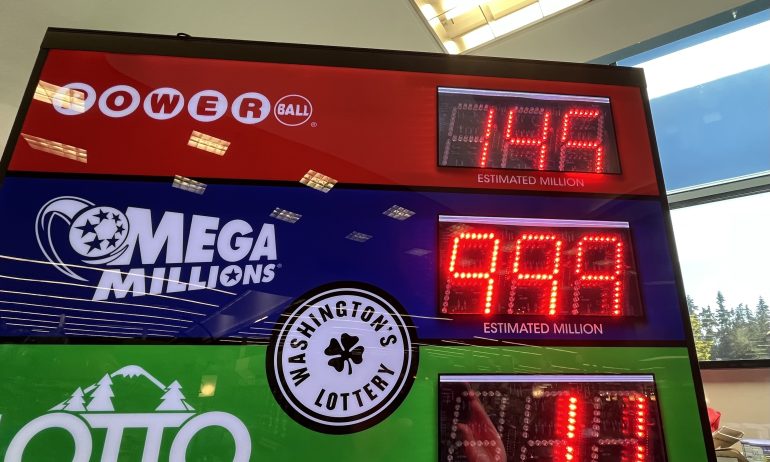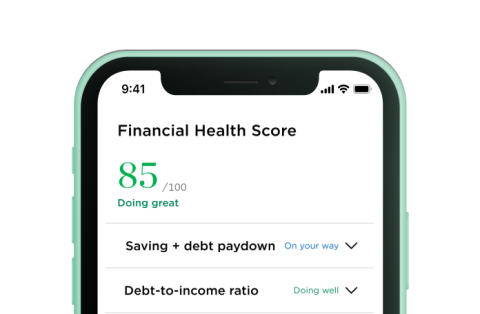How the Lottery Works and How Much You’d Keep If You Won

Many or all of the products featured here are from our partners who compensate us. This influences which products we write about and where and how the product appears on a page. However, this does not influence our evaluations. Our opinions are our own. Here is a list of our partners and here's how we make money.
When a national lottery jackpot balloons to hundreds of millions of dollars — or even more than a billion — a fever seems to sweep across the country. A jackpot of that size is not an easy number to wrap your head around, but they’ve become increasingly common in the past few years. And U.S. consumers are spending more and more on tickets each year, hoping to win it all.
As eye-popping as a billion-dollar prize might be, the winner doesn’t get to keep all of it once lottery formulas and tax collectors have their say. If you want a chance to win the ultimate jackpot, here’s what to know.
How does the lottery work?
Winning the lottery starts with buying a ticket. The biggest prizes are awarded in Mega Millions and Powerball.
Each player picks a series of numbers that they hope will be randomly selected during the next drawing. The jackpot goes to the person (or people) who pick all six numbers correctly. The odds of doing that are shockingly low.
If no one picks the right set of numbers, no one wins, and the jackpot continues to grow until the next drawing.
How to play Powerball
You can play Powerball in 45 states, plus Washington, D.C., Puerto Rico and the U.S. Virgin Islands. Drawings are broadcast live every Monday, Wednesday and Saturday at 10:59 p.m. Eastern time.
Tickets cost $2. To play, pick five numbers between 1 and 69 and a Powerball number from 1 to 26 (or have them randomly generated). The odds of picking all six numbers correctly are about 1 in 292 million.

How to play Mega Millions
Mega Millions can be played in 45 U.S. states, as well as Washington, D.C., and the U.S. Virgin Islands. Players can buy as many $2 tickets as they want. Drawings take place twice a week, on Tuesdays and Fridays.
Each ticket requires you to pick five numbers between 1 and 70, and a sixth number between 1 and 25 (or, you can let the lottery folks generate the numbers for you).
Your odds of picking the winning numbers are roughly 1 in 303 million.
Where do lottery prizes come from?
Lottery prizes are funded through ticket sales. In 2023, players spent more than $113.3 billion on lottery tickets in the U.S., according to the North American Association of State and Provincial Lotteries.
Where does lottery revenue go?
The lotteries association estimates that 65% of revenue from ticket sales goes into the prize pool, and 24% is used for state initiatives.
Each state decides how to distribute its lottery revenue to selected initiatives. For example, Florida uses a portion of lottery sales to fund public education, according to the Florida Lottery website.
As for the rest of the total revenue, the lotteries association estimates 5% is used to cover lottery operating costs, and another 6% is paid to retailers as commission.
What are the lottery payout options?
Jackpot winners can choose one of two payout options: They can get the full prize spread out in payments over 29 years (called the annuity option) or take a smaller one-time lump sum.
The lottery annuity option
When a lottery like Powerball advertises a big jackpot, like October 2023's $1.765 billion prize, it doesn’t have that sum sitting in a vault, ready to be handed to the next winner. Instead, lottery jackpots are calculated based on how much money you’d get if the sum of the current prize pool were invested in an annuity for three decades. That means you would eventually get the full sum, but it would take 30 years.
With the annuity option, you would receive a first payment when you win, followed by 29 annual payments that increase each year by 5%. If you were to die before all the annual payments were made, the rest would become part of your estate.
Powerball doesn’t specify the size of its first annuity payment. But if you won a Mega Millions jackpot and selected the annuity option, your first payment would be roughly 1.5% of the jackpot, according to the Mega Millions website. For a jackpot of $1.765 billion, that comes to nearly $26.5 million. The payout would get 5% bigger each year after that.
The cash option
The cash option is based on what the lottery has in its prize pool on the day of the draw. For the $1.765 billion Powerball jackpot, the cash option was $774.1 million, which is a little less than half the jackpot.
But if you chose the cash option and invested the winnings, you could end up earning more than you would with the annuity option. For example, the average stock market return is roughly 10% per year before inflation.
The cash option is the most common choice among lottery winners, according to a list of past Powerball winners.

How much are lottery winnings taxed?
If you win nearly a billion dollars in the lottery, you definitely owe federal income tax on it. To start, 24% of your winnings are withheld for the IRS. How much that is depends on whether you went for the cash or annuity option, since you only pay taxes on what you receive in a given year.
If you won the Powerball jackpot and took the cash option of $774.1 million, you’d see about $185.8 million withheld for federal income taxes, leaving you with about $588.3 million. Come April, you’d likely owe additional federal income taxes.
State taxes are another matter. If you buy a lottery ticket and win in your home state, you’ll owe state income taxes, if your state collects them. How much you’d owe would be determined when you file your state income tax return. Your state will take into account what you already paid. You can estimate the numbers on your big win with our lottery tax calculator.
If you buy a ticket and win while traveling out of state, you could be taxed in both places (again, assuming both states have an income tax). That’s because the state where you purchased the ticket likely will withhold taxes when you win.
How much you’d pay in state taxes, especially if you bought the ticket in another state, can be complicated. If you find yourself in this scenario, talk with a tax accountant to sort it out.
Simple tax filing with a $50 flat fee for every scenario
With NerdWallet Taxes powered by Column Tax, registered NerdWallet members pay one fee, regardless of your tax situation. Plus, you'll get free support from tax experts. Sign up for access today.
What to do if you win the lottery
If you win the lottery, your first priority is to protect your ticket. Whoever possesses a winning lottery ticket gets to claim the award.
Next, consider your anonymity. Each state has its own laws about whether lottery winners have to be publicly identified. Keeping your name out of the news and telling as few people as possible protects you from scammers and long-lost “friends” who want to get back in touch.
The key is to slow down, said Lisa Kirchenbauer, founder and president of Omega Wealth Management in Arlington, Virginia. Kirchenbauer is a certified financial planner. “Don’t start spending the money before you have time to plan and think.”
She says anyone who finds themselves suddenly wealthy should put together a team of professionals, including an attorney, accountant and financial planner. Among other decisions, these professionals can help you weigh the lottery payout options. Both the annuity option and the cash option have their pros and cons, she says.
“Your team will help you decide which option is best for you,” she said. “It's not a one-size-fits-all decision.”
How to claim lottery winnings
Each participating state has its own rules about how to claim a Powerball or Mega Millions reward. In fact, the length of time you have to file your claim ranges from 90 days to a year from the date the numbers were drawn. Make sure you review the rules in the state where you purchased the ticket.
What are the largest lottery jackpots ever?
A lottery jackpot has crossed the $1 billion-dollar mark just nine times. Seven of those billion-dollar jackpots occurred since January 2021, making it clear big lottery jackpots are becoming more common.
A Powerball jackpot estimated at $2.04 billion became the largest lottery jackpot ever when it was won in November 2022.
Mega Millions set its own record with a $1.58 billion jackpot won in August 2023. It was the fourth-largest jackpot in lottery history.
» MORE: How to spend a billion dollars
The 10 largest lottery jackpots
$2.04 billion (Powerball, Nov. 8, 2022 — one winning ticket).
$1.765 billion (Powerball, Oct. 11, 2023 — one winning ticket).
$1.586 billion (Powerball, Jan. 13, 2016 — three winning tickets).
$1.58 billion (Mega Millions, Aug. 8, 2023 — one winning ticket).
$1.537 billion (Mega Millions, Oct. 23, 2018 — one winning ticket).
$1.348 billion (Mega Millions, Jan. 13, 2023 — one winning ticket).
$1.337 billion (Mega Millions, July 29, 2022 — one winning ticket).
$1.08 billion (Powerball, July 19, 2023 — one winning ticket).
$1.13 billion (Mega Millions, March 26, 2024 — one winning ticket).
$1.05 billion (Mega Millions, Jan. 22, 2021 — one winning ticket).

on Capitalize's website

